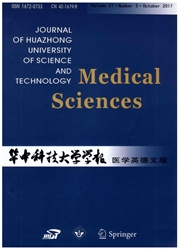

 中文摘要:
中文摘要:
Mesenchymal stem cells (MSCs) were induced into a nucleus pulposus-like phenotype utilizing simulated microgravity in vitro in order to establish a new cell-based tissue engineering treatment for intervertebral disc degeneration. For induction of a nucleus pulposus-like phenotype, MSCs were cultured in simulated microgravity in a chemically defined medium supplemented with 0 (experimental group) and 10 ng/mL (positive control group) of transforming growth factor β1 (TGF-β1). MSCs cultured under conventional condition without TGF-β1 served as blank control group. On the day 3 of culture, cellular proliferation was determined by WST-8 assay. Differentiation markers were evaluated by histology and reverse transcriptase-polymerase chain reaction (RT-PCR). TGF-β1 slightly promoted the proliferation of MSCs. The collagen and proteoglycans were detected in both groups after culture for 7 days. The accumulation of proteoglycans was markedly increased. The RT-PCR revealed that the gene expression of Sox-9, aggrecan and type Ⅱ collagen, which were chondrocyte specific, was increased in MSCs cultured under simulated microgravity for 3 days. The ratio of proteoglycans/collagen in blank control group was 3.4-fold higher than positive control group, which denoted a nucleus pulposus-like phenotype differentiation. Independent, spontaneous differentiation of MSCs towards a nucleus pulposus-like phenotype in simulated microgravity occurred without addition of any external bioactive stimulators, namely factors from TGF-β family, which were previously considered necessary.
 英文摘要:
英文摘要:
Mesenchymal stem cells (MSCs) were induced into a nucleus pulposus-like phenotype utilizing simulated microgravity in vitro in order to establish a new cell-based tissue engineering treatment for intervertebral disc degeneration. For induction of a nucleus pulposus-like phenotype, MSCs were cultured in simulated microgravity in a chemically defined medium supplemented with 0 (experimental group) and 10 ng/mL (positive control group) of transforming growth factor β1 (TGF-β1). MSCs cultured under conventional condition without TGF-β1 served as blank control group. On the day 3 of culture, cellular proliferation was determined by WST-8 assay. Differentiation markers were evaluated by histology and reverse transcriptase-polymerase chain reaction (RT-PCR). TGF-β1 slightly promoted the proliferation of MSCs. The collagen and proteoglycans were detected in both groups after culture for 7 days. The accumulation of proteoglycans was markedly increased. The RT-PCR revealed that the gene expression of Sox-9, aggrecan and type Ⅱ collagen, which were chondrocyte specific, was increased in MSCs cultured under simulated microgravity for 3 days. The ratio of proteoglycans/collagen in blank control group was 3.4-fold higher than positive control group, which denoted a nucleus pulposus-like phenotype differentiation. Independent, spontaneous differentiation of MSCs towards a nucleus pulposus-like phenotype in simulated microgravity occurred without addition of any external bioactive stimulators, namely factors from TGF-β family, which were previously considered necessary.
 同期刊论文项目
同期刊论文项目
 同项目期刊论文
同项目期刊论文
 Isolation and identification of cancer stem cells from human osteosarcom by serum-free three-dimensi
Isolation and identification of cancer stem cells from human osteosarcom by serum-free three-dimensi Video-Assisted Anterior Transcervical Approach for the Reduction of Irreducible Atlantoaxial Disloca
Video-Assisted Anterior Transcervical Approach for the Reduction of Irreducible Atlantoaxial Disloca 期刊信息
期刊信息
